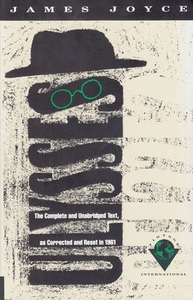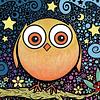Take a photo of a barcode or cover
Meant to be a novel where you spend time in the characters’ minds rather than plot driven. I hated being in either of their minds.
I know this is, for many, the greatest novel of the 20th century. It has never been a particularly moving novel for me, though I admire the craft of it and the ambitiousness of the design. I really enjoyed "Dubliners" and, for the most part, "A Portrait of the Artist as a Young Man." But this one, not so much. I plan to reread it at some point. If you're bold enough to try hacking your way through it, I suggest Harry Blamiers' "The New Bloomsday Book: A Guide Through Ulysses" as a companion.
challenging
emotional
funny
inspiring
slow-paced
Plot or Character Driven:
Character
Strong character development:
Complicated
Loveable characters:
Complicated
Diverse cast of characters:
Complicated
Flaws of characters a main focus:
Yes
Well now that I'm thoroughly exhausted and feeling accomplished....
I can see why this book gets the acclaim that it does. It is very dense and difficult to understand so I highly recommend anyone who is planning on reading this, please do it with some sort of guide, SparkNotes, etc. It was worth it to get through it though. Joyce does a lot of clever things, and some of them only become more apparent in the later chapters.
Ultimately, I liked the book and what it tried to do, but there were still a lot of frustrating sections and that makes it hard to give it a personal five-star rating. I like to be able to comprehend and understand what is going on minute to minute in books I read and sometimes the stream of consciousness style employed by Joyce in combination with extremely dense vocabulary and styles of language make it really painful to get through parts of the book.
Keep your dictionary handy while reading this one. I sent my Kindle Paperwhite 2 Vocabulary Builder nearly to 800 words before it bogged down the device and I had to start deleting some.
Lots of cleverness, though. "The Wandering Rocks" was probably the first section where I really began to appreciate the book. "Oxen of the Sun" was cool in concept if incredibly slow reading and lots of headaches. "Ithaca" had some cool parts in it, especially when Bloom considers the universe (a thing I'm surprised the reading guides didn't mention or pick up on, quite a spiritual passage rendered in very cold scientific language). I really liked Molly's stream of consciousness in "Penelope." The characters were very real and realistic, I enjoy the way that Joyce reminds the reader of the complexity of perspectives and how many different ways there are to look at different events and how it is all interconnected ("The Wandering Rocks" was fantastic for that).
I don't regret picking this up, as much as I dreaded trying to get through it. It was worth it, to anyone who enjoys artistic storytelling and literary techniques.
I can see why this book gets the acclaim that it does. It is very dense and difficult to understand so I highly recommend anyone who is planning on reading this, please do it with some sort of guide, SparkNotes, etc. It was worth it to get through it though. Joyce does a lot of clever things, and some of them only become more apparent in the later chapters.
Ultimately, I liked the book and what it tried to do, but there were still a lot of frustrating sections and that makes it hard to give it a personal five-star rating. I like to be able to comprehend and understand what is going on minute to minute in books I read and sometimes the stream of consciousness style employed by Joyce in combination with extremely dense vocabulary and styles of language make it really painful to get through parts of the book.
Keep your dictionary handy while reading this one. I sent my Kindle Paperwhite 2 Vocabulary Builder nearly to 800 words before it bogged down the device and I had to start deleting some.
Lots of cleverness, though. "The Wandering Rocks" was probably the first section where I really began to appreciate the book. "Oxen of the Sun" was cool in concept if incredibly slow reading and lots of headaches. "Ithaca" had some cool parts in it, especially when Bloom considers the universe (a thing I'm surprised the reading guides didn't mention or pick up on, quite a spiritual passage rendered in very cold scientific language). I really liked Molly's stream of consciousness in "Penelope." The characters were very real and realistic, I enjoy the way that Joyce reminds the reader of the complexity of perspectives and how many different ways there are to look at different events and how it is all interconnected ("The Wandering Rocks" was fantastic for that).
I don't regret picking this up, as much as I dreaded trying to get through it. It was worth it, to anyone who enjoys artistic storytelling and literary techniques.
This is undoubtedly a work of art, but as much as it is a puzzle to be examined and solved word by word. I certainly didn't understand most of it, and often got more enjoyment from reading analyses of the text than the text itself - the most difficult episodes: Oxen of the Sun, Proteus. My favourite episodes - Ithaca, Circe, Sirens, Proteus. I really liked how the questioner in Ithaca, at first mathematical and objective, became more interested in the replies and in subjectivities while still trying to maintain the scientific appearance. Ulysses being a work of art taught me what art can be or can mean.
Also, I now have the phrase "ineluctable modality of the visible" stuck in my head.
Also, I now have the phrase "ineluctable modality of the visible" stuck in my head.
adventurous
challenging
emotional
funny
reflective
sad
slow-paced
Plot or Character Driven:
Character
Strong character development:
Yes
Loveable characters:
Yes
Flaws of characters a main focus:
Yes

